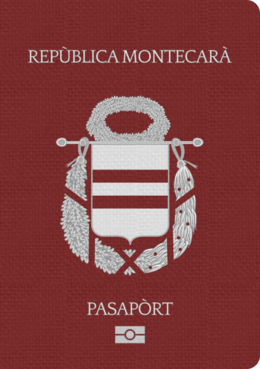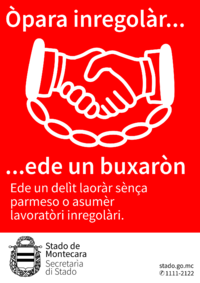Montecaran nationality law: Difference between revisions
| Line 43: | Line 43: | ||
== Loss of citizenship == | == Loss of citizenship == | ||
Montecaran citizenship may be lost | Montecaran citizenship may be lost immediately by performing certain actions, including: | ||
* Intentionally acquiring the citizenship of another country | * Intentionally acquiring the citizenship of another country | ||
* Becoming a member of a royal or noble house | * Becoming a member of a royal or noble house | ||
| Line 50: | Line 50: | ||
* Being adopted by foreign parents | * Being adopted by foreign parents | ||
Montecarans may voluntarily renounce their citizenship only before a consul abroad, and any renunciation will be accepted only if another citizenship has been acquired in order to prevent {{wp|statelessness}}. | Montecarans may voluntarily renounce their citizenship only before a consul abroad, and any renunciation will be accepted only if another citizenship has been acquired in order to prevent {{wp|statelessness}}. | ||
== Rights and duties of citizens == | == Rights and duties of citizens == | ||
Revision as of 03:44, 26 August 2020
| Montecaran passport | |
|---|---|
 The front over of a current Montecaran regular passport | |
| Issued by | Secretariat of State |
| Valid in | All countries and territories |
| Type of document | Passport |
| Purpose | Identification |
| Eligibility requirements | Montecaran citizenship |
| Expiration | 10 years if aged 16 or over 5 years if under 16 |
| Cost | Ł250 (first issue) Ł175 (renewal or replacement) |
Montecaran citizenship is the status of being a citizen of Montecara. It can be obtained by either birth or naturalization. It is based on the following principles:
- Jus sanguinis
- Sole allegiance (i.e. no multiple citizenship)
- Citizenship as a set of duties as well as rights
Acquisition of citizenship
By birth
Anyone who is born to a parent who is a Montecaran citizen is a Montecaran citizen by right. This is considered prima facie if the child is the offspring either of a married couple where at least one parent is Montecaran, or of a single Montecaran woman. In cases where Montecaran citizenship would issue through an unmarried Montecaran father, a paternity test is required. Foreign children adopted by Montecarans become citizens when the adoption is finalized. Foundlings in Montecaran territory are considered Montecaran citizens until a parent is discovered.
The birth or adoption must be registered with the Secretariat of Social Protection or, if abroad, a Montecaran consul.
By naturalization
Acquiring Montecaran citizenship is a lengthy and arduous process. Applicants generally must first acquire permanent resident status and live in Montecara for at least sixteen years while adhering to the terms of their residency agreement. (Time spent living in Montecara while a minor counts double.) Once these requirements are met, the commune must favorably approve the application, which is then placed on the ballot for approval by the entire citizenry in keeping with Montecara's constitution. If the vote is in favor, the aspiring citizen will attend a naturalization ceremony before the Colegio where he or she will take an oath and receive a certificate of naturalization.
In order for an application to be successful, the permanent resident must:
- Speak fluent Montecaran,
- Assimilate into Montecaran society and the local community,
- Obey Montecaran law,
- If under the age of 30, fulfill national service requirements.
Because the conditions for naturalization are so difficult to meet, fewer than 50 new Montecaran citizens are naturalized in a typical year.
Loss of citizenship
Montecaran citizenship may be lost immediately by performing certain actions, including:
- Intentionally acquiring the citizenship of another country
- Becoming a member of a royal or noble house
- Serving in the military of a foreign country
- Serving in civil office in a foreign country
- Being adopted by foreign parents
Montecarans may voluntarily renounce their citizenship only before a consul abroad, and any renunciation will be accepted only if another citizenship has been acquired in order to prevent statelessness.
Rights and duties of citizens
Citizens of Montecara have the right to:
- Membership in the Popular Assembly or Senate
- Live and work indefinitely in Montecara
- Obtain a Montecaran passport
- Enter or leave Montecara at will
Citizens of Montecara have the duty to:
- Serve in civil office or as a lay judge when called upon
- Protect Montecara through military service when called upon
- Obey Montecaran laws
Montecaran passport
The standard Montecaran passport has a burgundy cover with the name of the state and the national coat of arms.
Information on the data page includes the passport holder's photo, name and date of birth, nationality, and sex, and the passport's number, issuing authority, and dates of issuance and expiration. The passport holder's place of birth is also included; in most cases, this is the name of the relevant country (according to modern borders).
People born in Glacia have their place of birth listed as GLASIA. Those born in international waters or skies have their place of birth recorded as ALTA MARE ("high seas") or I ÇIELI ("the skies"), respectively.
Travel freedom of Montecaran citizens
Montecarans enjoy some of the greatest travel freedom in the world, with visa-free or visa-on-arrival access to a majority of the world's countries.
Montecaran citizens are allowed visa-free access to the Euclean Community for up to 180 days in any 360-day period. A passport is not required; a national identification card (Ùnivers card) is sufficient proof of citizenship.
